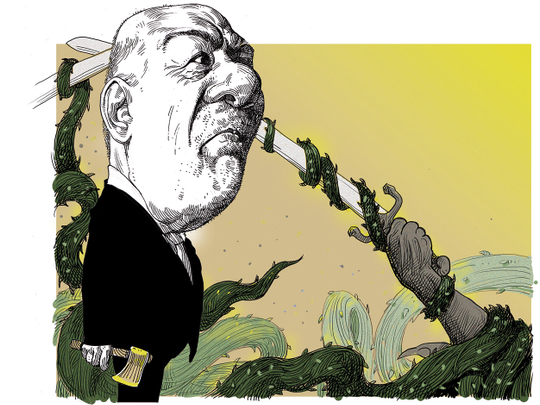
The political silence out of Baghdad is profoundly disturbing as the bombs continue to kill and maim by the hundred. Iraq needs a political way forward that all its citizens can join with good heart and unite to reject the terror that has become a regular feature.
The government and its international coalition partners talk of the gains they have made, which they have to emphasise. But they do not talk about the slowness of the advance, their failure to retake Mosul and the inadequate political offering from the Baghdad government to the Iraqis of the west and north that languish under the control of Daesh (the self-proclaimed Islamic State of Iraq and the Levant).
This week, Prime Minister Haider Al Abadi announced that government forces have started the attack to retake Fallujah, the town between Ramadi (retaken in December) and Baghdad. But despite the drama of Al Abadi’s declaration that “zero hour for the liberation of Fallujah has arrived”, it is uncertain how the battle will go. The government says that it will liberate the city once and for all and has announced the death of the Daesh ‘wali’ in charge of the city.
But there is a certain Keystone Cops feel to the advance as the Iraqi government has urged the 60,000 to 90,000 civilians in the town to flee or raise a white flag over their homes. This was queried by a former US military adviser working in Iraq, who pointed out that while a white flag might stop the government troops from shooting you, it would also act as a target for Daesh forces. In reality, anyone still living in Fallujah has seen so much violence that they do not need Baghdad to tell them how to avoid being shot.
If Fallujah is retaken, the government will control the south and west. It will leave Mosul as the only major Iraqi city that Daesh would still control and government forces claim to have largely cut its communications with their November retaking of Sinjar on the road to Raqqa in Syria.
But this kind of roll-call of success is illusory. It gives the impression that the government is winning the struggle. It does not take into account that Daesh does not need to govern territory or populations to meet its political objectives. It is an asymmetric terrorist group that works by causing chaos and fear and its brief foray into governance is not a necessary part of its long-term plans or success.
Disrupting life
This is a big part of why Daesh’s bombing campaign in Baghdad has picked up in the last few months. In part, the bombs are intended to force the Iraqi Security Forces to maintain their levels in Baghdad, which keeps them from joining the battle zones in Fallujah and Mosul. But more importantly, the Daesh bombs undermine people’s confidence in Al Abadi’s government as they prove week after week that the Iraqi state has failed and is not capable of protecting its citizens. The message is very clear that democracy will not produce peace for Iraqis.
“Daesh is communicating that it can and will continue to horrifically disrupt life for Iraqis, even if it loses all its territory, and that the Iraqi government, and any international force, will be unable to prevent it from doing so,” said Sajad Jiyad of the Al Bayan Centre in Baghdad, writing with Michael Knights of the Washington Institute. “This same message will go to people in Syria and other areas in which Daesh has a presence, drawing a picture of bloody violence, where innocent people are the victims in an attempt to spread fear, hatred and anger.”
The two authors add that Daesh’s sectarian aim is to start yet another cycle of deadly revenge attacks on Baghdad’s Sunni neighbourhoods. Even if this round of attacks does not have that effect, and Iraq manages to avoid a return to the sectarian violence of previous years, it is all too true that sustained bombing campaign will increase sectarian tensions.
Jiyad and Knights argue that the answer is a new Iraqi “surge”, backed by the international coalition, to help stop the risk of strategic terrorist attacks in Baghdad, which are distracting the government from the larger struggle in Iraq, empowering the urban militias to a dangerous degree and delaying the all-important battle to retake Mosul.
“In the same way that the coalition helped Iraq to urgently address the risk posed by Mosul Dam, there is an urgent need for the coalition to help Iraq tackle the long-standing issue of Baghdad’s vulnerability to bombings,” they say. “Just as Mosul Dam could bring a devastating flood of water to Baghdad, the Daesh bombings could yet bring a devastating flood of sectarian attacks and militia rule to Baghdad. Only by fusing the technology, planning and intelligence expertise of the coalition with Iraq’s manpower and ground knowledge can the threat be brought under control before radicals on both sides undermine the capital.”
Of course, it will be better if the Iraqi government can recover its sense of direction and do this on its own, but the continuing and very disturbing sense of drift from the lacklustre performance of Al Abadi’s government looks set to continue.










